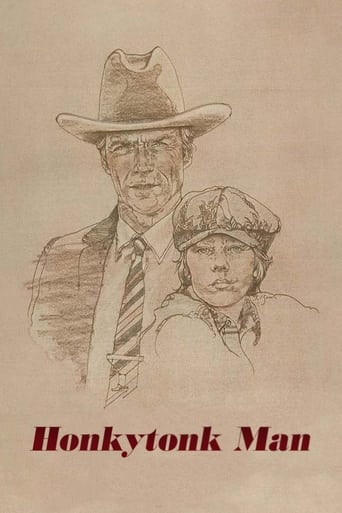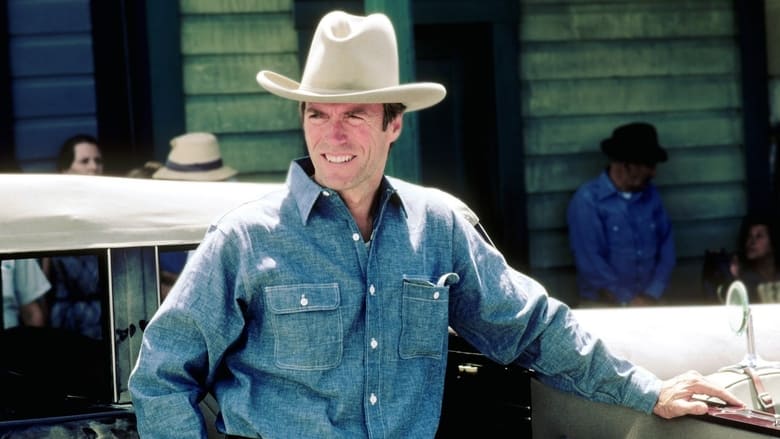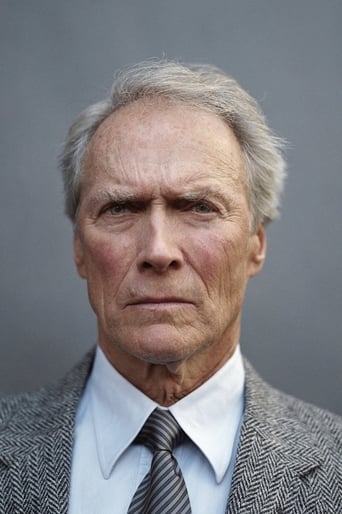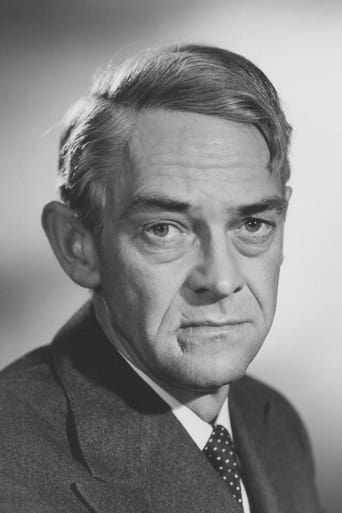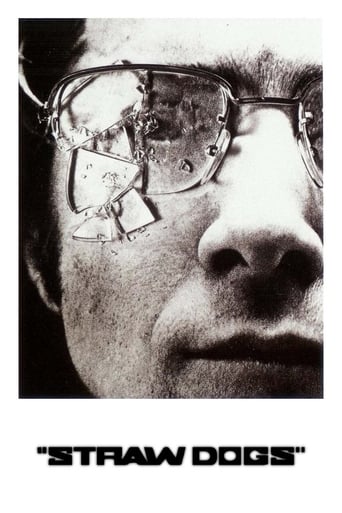Honkytonk Man (1982)
During the Great Depression, a young boy leaves his family's Oklahoma farm to travel with his country musician uncle who is trying out for the Grand Ole Opry.
Watch Trailer
Free Trial Channels
Cast


Similar titles
Reviews
Surprisingly incoherent and boring
Not even bad in a good way
The performances transcend the film's tropes, grounding it in characters that feel more complete than this subgenre often produces.
The plot isn't so bad, but the pace of storytelling is too slow which makes people bored. Certain moments are so obvious and unnecessary for the main plot. I would've fast-forwarded those moments if it was an online streaming. The ending looks like implying a sequel, not sure if this movie will get one
By the time he started directing his own feature films in the early 1970s, Clint Eastwood had already established his trademark 'Man with No Name' screen persona. From his directorial debut onward, it's as if Eastwood used his ability to helm his own projects as a deliberate attempt to undermine the qualities that people knew him for. This tough guy wanted to show the whole world that he too could be vulnerable; he had a sensitive side.Coming off the heels of his wonderful departure in "Bronco Billy", a film about a band of misfits living in the myth of the old West (I pretend "Firefox" doesn't exist), Eastwood continued to make another left turn in his career with "Honkytonk Man". Eastwood plays Red Stovall, a small time country singer with a bigger alcohol problem in Depression era Oklahoma. At the start of the film, Red literally crashes into his sister's farm in the middle of a dust storm. After settling in, he reveals an audition opportunity at the Grand Ole Opry in Nashville, and before too long, is on the road to Tennessee with his nephew Whit and his grandfather-in-law played by longtime character actor John McIntire (he played the sheriff in "Psycho").Whit is the extension of the audience, and this is as much his story as it is Red's. The majority of the film plays like a coming-of-age road movie, with the usual plot devices you might find in such a piece. On the surface, the whole work initially comes off as a vanity project, considering Whit is played by Eastwood's own adolescent son Kyle. He isn't horrible, drifting from scene to scene with his wide-eyed freckle face. Eastwood's singing voice is worse. I've never seen the 1969 western musical "Paint Your Wagon" that featured him singing, and I was surprised to learn that he cut a novelty album in the early 1960s during the height of his "Rawhide" television fame. In "Honkytonk Man", it just sounds like he's whispering while singing and it makes the premise of a prestigious musical audition hard to believe.The film's greatest virtue is McIntire as the Grandpa, a role originally offered to James Stewart. While I don't want to imagine how wonderful that casting would have been, McIntire pulls a career best performance, and disappears before the final act without much of an explanation, hindering the impact of the final section of the film. In one of the film's most poignant moments, Whit and his Grandpa stare out into the Oklahoma wilderness right after setting out on the road. McIntire's character reminisces about the long gone promised land that Oklahoma was during the 1890s land lotteries. Now, during the Great Depression, that promised land is California, but all he wants is to return home to Tennessee. Whit encourages him to remain hopeful, but McIntire recognizes the limits of his old age, and the fact that the Oklahoma dream never panned out like he thought it would. "It's all turned to dust," he exclaims regrettably.McIntire is "Honkytonk Man"'s greatest asset, and after the film arrives at its destination and its focus shifts back to the relationship of uncle Red and his nephew Whit, it turns into a well-meaning cringe-fest. Fans of old time country music or Depression era dramas will find a lot to like about this film. If you don't like sentimental Eastwood, then spend the two hours watching a "Dirty Harry" sequel instead.
This movie has an okay story, a bit in the road-trip theme, and Eastwood's son, Kyle, is an okay actor, but the other actors don't impress me much. Eastwood didn't seem to care much about making the movie an authentic "period piece", and you will often see details in the background from modern times, as well as the haircuts, which are obviously from the early 80's. Several times he shows musicians and they seemed to put the least amount of effort into looking authentic. At the Grand 'Ol Opry, the female singer who is on after Eastwood is singing in a modern style, and anyone who listens to music from the 1930's knows that doesn't fit. Even the music the bands are playing has a 70's/80's sound to it. Maybe they should have got T-Bone Burnett as musical director! They could have had a band on in the vein of the Carter Family, instead. I guess they had a limited budget and it shows, but it could have been a much better movie than it turned out to be. Other things I noticed were, the cement curbs in the really luxurious looking cemetery in the film with all the green grass and trees...excuse me, this is in the 1930's, and as far as I can tell, most graveyards didn't look that maintained, as there was little money. Little things like that that kind of ruin the illusion of a rough period in the US. Even the cars sitting outside the Ryman Theater are highly polished and obviously collector pieces rented for the film and the owners didn't want to get any dust on them. With all the detail Eastwood put into his later masterpiece films, I am a little disappointed, but it is still a decent movie, I gave it a 6 out of 10.
Clint Eastwood, looking drawn, rumpled and weathered, takes a radical, courageous departure from his usual reliably stalwart tough guy persona in this gently moving, defiantly unheroic and very low-key seriocomic 30's Depression-era set drama as Red Stovall, a boorish, feckless, dissolute, alcoholic drifter, failed would-be country-and-western singer/songwriter and general all-around worthless, ill-tempered and irresponsible rapscallion with an unfortunate knack for getting into trouble, messing things up and making life hell for everyone who gets close to him. Slowly dying from tuberculosis, Red makes a lengthy, arduous pilgrimage from Oklahoma to Tennesse to make his dream of performing at the legendary Grand Ole Opry come true, taking his foolishly awestruck nephew Whit (nicely played by Clint's then 14-year-old son Kyle) and his frisky grandfather (a superb John McIntire) along with him. During their eventful odyssey Whit breaks Red out of jail after Red is arrested by drawling good ol' boy sheriff Jerry Hardin for stealing chickens, Red takes Whit to a whorehouse so the boy can lose his virginity, and the group has colorful encounters with an obnoxious, conniving teenage girl (a perfectly irritating Alexa Kenin) who tries to dupe Red into believing he impregnated her, grubby mechanic Tracey Walter, venal highway patrolman Tim Thomerson, and mean, untrustworthy bar owner Barry Corbin prior to Red arriving in Nashville for his do-or-die audition, only to erupt into a coughing fit in front of the hard-nosed talent scout (a marvelous cameo by John Carpenter movie regular Charles Cyphers) while in the middle of belting out the wonderfully regretful and reflective titular song. Eastwood's subtle direction doesn't in any way force the wry humor or delicately heart-breaking sentiment found in Clancy Carlile's folksy, quietly observant script, allowing the story's considerable poignancy to stem naturally from the characters and the experiences they have. Eastwood furthermore delivers an excellent and convincing performance as Red, an atypical Eastwood lead who's initially quite unappealing and only becomes endearing in the picture's tragic closing sequences in which Red's deep-seated yearning to belatedly realize his potential and subsequently be somebody makes itself touchingly apparent. The rest of the cast, which also includes Verna Bloom and Matt Clark as Red's tolerant, long-suffering relatives, are every bit as fine.The elegant, lyrical cinematography by Bruce Surtees gives the film a misty, lived-in look that's a beguiling blend of warm heartfelt nostalgia (Eastwood was born in 1930 and partially grew up during the Great Depression; he traveled about the country with his itinerant laborer father during this troubled time) and scrappy downcast authenticity. Noted country-and-western producer Snuff Garrett was the music supervisor for the stand-out soundtrack; such famous and revered singing stars as Ray Price, Porter Wagner, Frizzell and West, blues singer Linda Hopkins, and especially Marty Robbins have telling bit parts -- Robbins, who died shortly before the movie opened theatrically, has a lovely moment as a back-up session musician who assumes lead vocal chores when Red becomes too weak and sickly to finish the song himself. Eastwood sings a few numbers with a frayed, raspy, worn-out baritone -- it's a hoarse, yet affecting croak which bespeaks countless years of hard living and heavy drinking with a bracingly matter-of-fact directness. Why, "Honkytonk Man" even comes complete with a provocative philosophical message: Sometimes it's the people you expect the least from who teach us the most about life. Unjustly vilified by most critics and ignored by audiences when it first came out, this tender little gem deserves to be rediscovered as one of Clint Eastwood's most surprising and adventurous as well as thoughtful and underrated change-of-pace cinematic excursions that he has ever made to date.
This film is one of Eastwood´s most compelling and strikes you right at the heart. It tells us a story with such a warmth and compassion about a theme as old as America itself. It is about a man and his love for his nephew, his music and his his desire to make a name for himself before his TB´ll end it all. Though Clint´s voice isn´t the best it does however strengthen our understanding of the motivation of a man that is running against time in a setting that is both harsh and unforgiving. The movie´s depiction of the depression is outstanding and the songs are stupendous. Watch for Marty Robbins who also sings half the theme song. All in all an outstanding movie that will stay in your heart for a long, long time...

